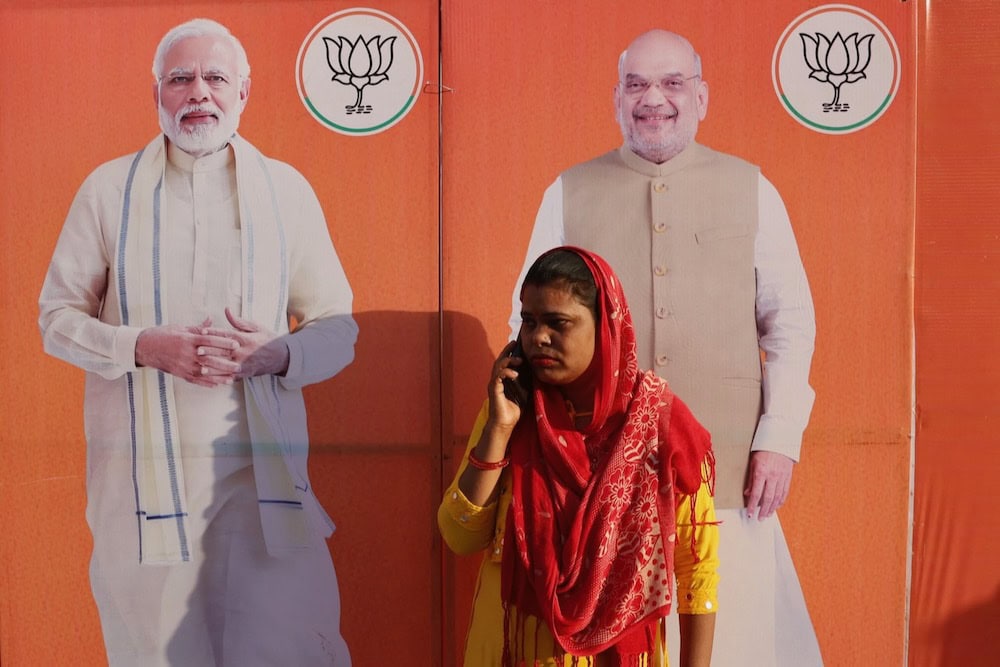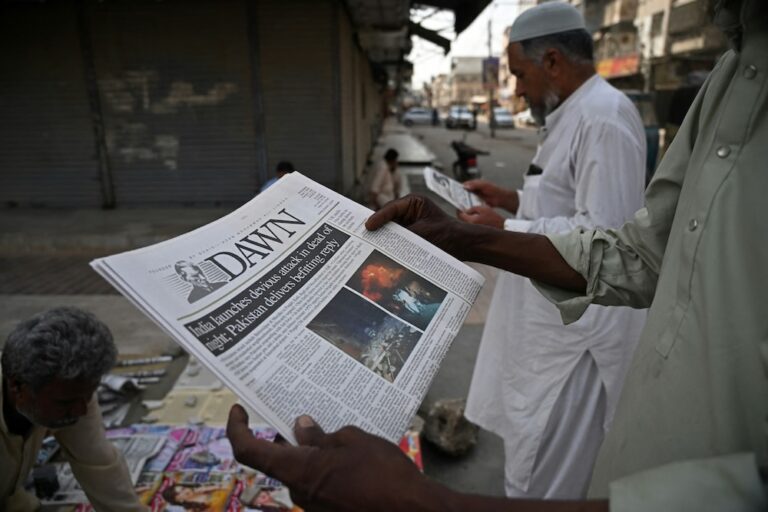April 2024 in Asia-Pacific: A free expression round-up produced by IFEX's regional editor Mong Palatino, based on IFEX member reports and news from the region.
India goes to the polls amid continuing media harassment and content blocking. China’s repressive model of media and internet governance is increasingly being imposed in the region. A worsening rise in blasphemy prosecutions in Pakistan. Good news: Thailand parliament passes Marriage Equality Bill and Indonesian court strikes down articles on defamation and “fake news”.
India: Information restrictions and media harassment during elections
India’s massive two-month election period started on 19 April amid grave concerns about the information restrictions imposed by the ruling Bharatiya Janata Party headed by Prime Minister Narendra Modi, who has been in power since 2014.
The Committee to Protect Journalists (CPJ) interviewed several journalists and summed up the challenges faced by those covering the elections: “Political violence, mob violence, criminalization of journalism, attacks by other journalists, online harassment, online censorship, and device hacking.”
Before the elections, authorities ordered the blocking of social media accounts linked to farmers’ protests, which raised alarm about the suppression of critical voices. The blocking of the YouTube accounts of Hindu news channels Bolta Hindustan and National Dastak, and the censoring of websites tracking hate speech, could further undermine the people’s right to information. This reflects the direct role of the government in censoring online content that it perceives as a threat or harmful to public interest.
IFEX member SFLC.in noted the lack of transparency regarding the blocking orders issued by the government. “There is a concerning lack of transparency in regard to website blocks as multiple Right to Information applications seeking information around blocked websites are not answered and confidentiality clauses are stated.”
Tech companies are also urged to ensure that their platforms will not be misused to spread disinformation and violate the privacy rights of their users. Deborah Brown, acting associate technology and human rights director at Human Rights Watch (HRW), reminded tech companies operating in India to adequately invest in content moderation, carry out rigorous human rights impact assessments, and meaningfully engage with civil society.
Meanwhile, Reporters Without Borders (RSF) offered ten concrete recommendations to political parties to ensure the promotion and protection of freedom of expression in the country.
- Immediately free the nine arbitrarily detained journalists, including five from the northern Jammu and Kashmir region
- Overhaul the terrorism laws so that they can no longer be used to persecute journalists
- End the censorship and surveillance of journalists
- Establish an independent commission of enquiry into cases of spying on journalists
- Protect the confidentiality of journalists’ sources
- Safeguard pluralism by regulating media concentration
- Adopt mechanisms for protecting journalists
- Put a stop to arbitrary Internet shutdowns
- End the restrictions on access to certain parts of the country
- Safeguard the foreign media’s right to cover India
The last item refers to the denial of visas and work permits to foreign journalists who are disliked by authorities because of their critical reporting. After 22 years in India, French journalist Vanessa Dougnac was forced to leave the country when authorities canceled her Overseas Citizen of India card and accused her of causing “biased negative perception of India”. On 19 April, the first day of elections, Australian Broadcasting Corporation South Asia bureau chief Avani Dias left India after a Ministry of External Affairs official claimed that her reporting had “crossed the line” and would not be given work credentials to cover the elections. Dias wrote about her departure on X (Twitter):
Censorship without borders? China’s model
The Beijing government has been imposing its repressive media policies and practices within its territories and even beyond its borders.
RSF Asia-Pacific Bureau Advocacy Officer Aleksandra Bielakowska was prevented from entering Hong Kong where she was supposed to meet journalists and monitor the trial of media entrepreneur Jimmy Lai, who is detained on alleged violations of the National Security Legislation. She narrated her deportation experience from the HK airport.
“They detained me for six hours, questioned me, and searched me and my belongings several times. After all this, I was deported under a nebulous pretext. This ordeal demonstrates how much the Hong Kong authorities fear NGO workers and human rights defenders who seek to report on the authoritarian climate that has taken hold in the territory that was once a bastion of press freedom.”
CPJ interviewed Bahram Sintash who recalled the detention of his father Qurban Mamut, a veteran editor known for his deep knowledge of the Uyghur language and culture. Sintash said his father was arrested in 2017 coinciding with China’s intensified crackdown on Uyghurs and other mostly Muslim ethnic groups. “China targeted Uyghur intellectuals first in order to more successfully repress Uyghur identity. They began by arresting individuals and then expanded their investigation to a larger network of Uyghurs,” Sintash explained.
Several media groups in the Philippines have released statements condemning claims by Chinese officials who accused journalists of manipulating videos showing the maritime tension between the two countries in the South China Sea. The Foreign Correspondents Association of the Philippines described the claim of Chinese officials as false and baseless, a “barefaced lie,” and also “an insult to the integrity of journalists and an alarming attempt to muzzle an independent press.”
A report published by ARTICLE 19 titled “The Digital Silk Road: China and the rise of digital repression in the Indo-Pacific,” looks into China’s digital infrastructure and how its influence extends to several countries in Asia. Michael Caster, Asia Digital Programme Manager at ARTICLE 19, warns against the adoption of China’s censorship machinery. “By expanding its authoritarian model, China aims to ultimately supplant the tenets of internet freedom and rights-based principles of global digital governance.”
Legal rights: Good news from Thailand and Indonesia
In Thailand, the Marriage Equality Bill was passed by the House of Representatives in March and passed first reading at the Senate in April, which raised hopes that the landmark legislation could be enacted within the year. Kyle Knight, interim co-director of the LGBTQI+ rights program at HRW, pointed out the importance of the bill. “Social acceptance has its limitations and is no substitute for protections grounded in law.”
If this happens, Thailand would be the first country in Southeast Asia, and the third in Asia after Taiwan and Nepal, to pass a law recognising same-sex marriages.
In Indonesia, the Constitutional Court has annulled two articles on “fake news” and defamation in the Criminal Code for being “ambiguous” and lacking in “clear parameters” that can limit the right of individuals to express their opinions. The petition was filed by human rights advocates, including IFEX member Alliance of Independent Journalists (AJI).
AJI chairperson Sasmito said the problem of “fake news” should be solved by “intensifying digital literacy, encouraging social media platforms to improve content moderation, ensuring transparent access to information, and improving the quality of journalism.”
New and noteworthy from Cambodia and Pakistan
In Cambodia, the Fundamental Freedoms Monitoring Project released its latest report which shows an 11 percent increase in documented restrictions and violations against fundamental freedoms in 2023 compared to the previous year. It highlighted the withdrawal of media licenses citing the forced closure of VOD, the country’s last remaining independent media outlet. It also sounded alarm over the increasing number of individuals who feel unable to freely exercise their right to freedom of expression in public.
In Pakistan, IFEX members Bytes for All and Digital Rights Foundation (DRF) released reports on the state of the freedom of expression and the efforts of civil society groups in defending the people’s right to information.
Bytes for All’s report explored the rise of the internet and how it led to an increasing number of blasphemy prosecutions in the country. It pointed out that “the misuse of blasphemy laws has a chilling effect on freedom of expression online.” It added that “religious minorities are particularly vulnerable to blasphemy accusations.”
DRF’s report reviewed the impact of their initiatives aimed at strengthening civic space such as the Cyber Harassment Helpline, Network of Women Journalists for Digital Rights, and the feminist e-magazine Digital 50.50.
Meanwhile, the Facter Weekly podcast by IFEX member Media Matters for Democracy (MMFD) features the fact-checked reports undertaken by the team intended to improve the work of newsrooms. An overview of the fact-checking initiative is presented in a tweet posted by MMFD:



